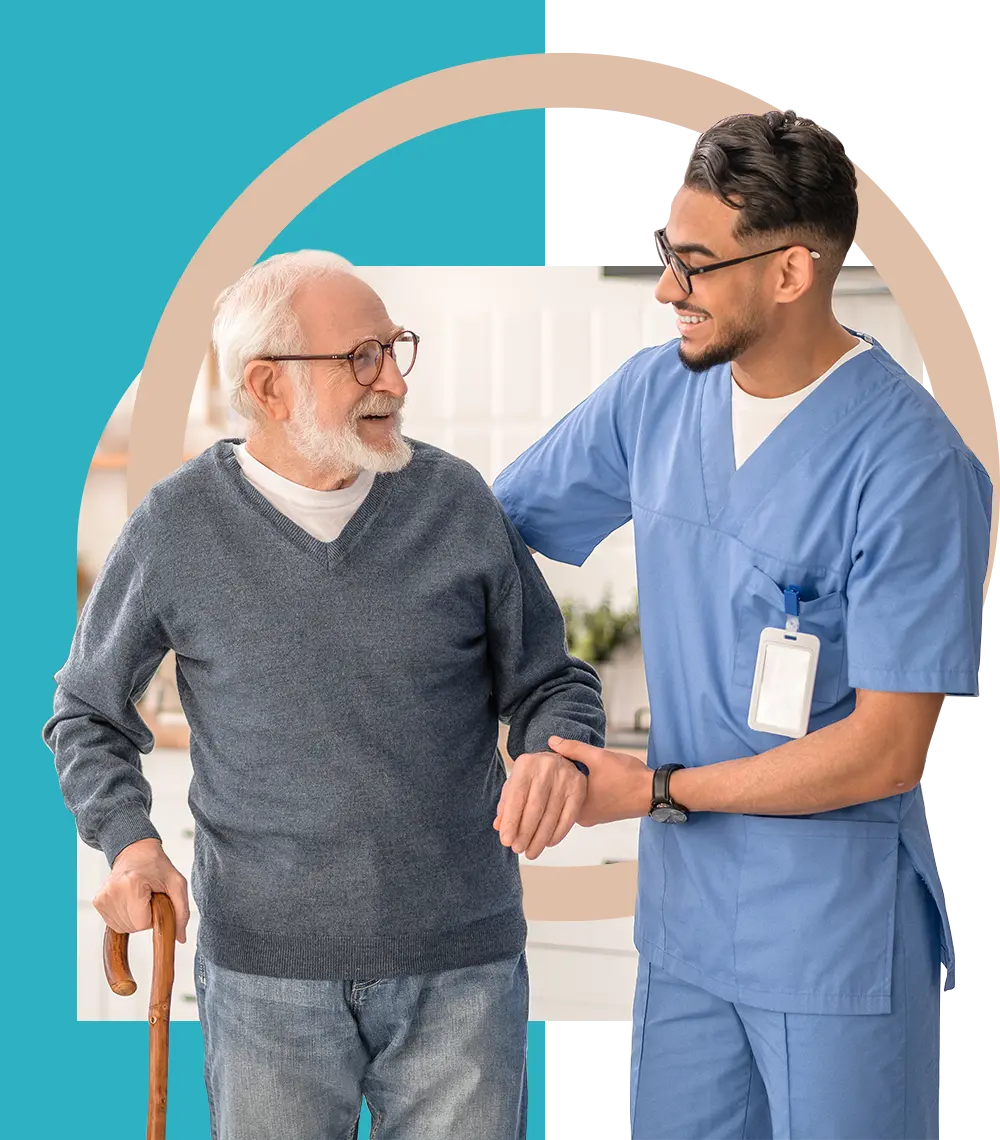Health Plans
Your members with polychronic conditions prefer home-centered care

Reduce high-cost utilization of the ER & hospital
Patients with multiple chronic needs drive your highest costs. Six in ten Americans live with at least one chronic disease, and four have two or more. Most see their primary care doctor once a year – on average for 18 minutes.
According to studies, Medicare beneficiaries with one to four chronic conditions have the highest risk for emergency department visits and admissions.
The Spiras Care nurse develops a trusted patient relationship to provide individualized, home-based, whole-person care for Chronic Heart Failure, Diabetes, COPD, Hypertension, and other conditions. The Spiras Care nurse becomes a clinical family member through their trusted patient relationship.
As a result, we increase patients’ access to care, improve self-care, enhance the patient and provider relationship, and keep your members out of the hospital.

Nurse practitioner-driven care
Our experienced team of nurse practitioners, nurses, and respiratory therapists deliver in-home and technology-enabled care augmented with 24/7 access and remote monitoring.
Collaboration with providers
We minimize provider abrasion with your network physicians by keeping them abreast of the patient’s condition, including follow-up notes, updated care plans, and medication changes through provider-to-provider consultation.
Medication adherence
Spiras Care interactions include medication adherence check-ups. We measure ongoing improvement while encouraging patient compliance. Download our Outcomes to learn more.
Social Determinants of Health
Spiras Health clinicians observe the patient’s home environment to assess health-related social needs. We integrate SDoH resources into our structured workflows by referring patients to appropriate resources, confirming closure on the issue, and documenting encounters with Z-codes for our clients.
Spiras Health improves medication adherence
50%
30-Day Adherence
82%
90-Day Adherence
95%
180-Day Adherence
40%
Hospitalization Reduction
20%
ER Usage Reduction
Home-Centered Clinical Model
When members understand their conditions, adopt healthier behaviors, and learn to recognize when symptoms worsen, they become better at self-management.
If a condition worsens, our patients know to contact their Spiras Health clinician, who can assess their needs, provide treatment, or recommend an immediate course of action.
Transition of Care
Spiras Care clinicians assess patients’ needs post-discharge and confirm or arrange a follow-up PCP visit. A licensed provider reconciles medication.
ADT data feeds ensure rapid follow-up with patients. Our follow-up confirms that the patient has a scheduled appointment with their PCP.
Cost-Efficient Team Approach
Our scalable, community-based teams deliver highly responsive in-home and telephonic care for small patient panels.
These field teams are overseen by Nurse Practitioners who provide guided video visits with patients. Medical Directors oversee Nurse Practitioners and round with them regularly.
Active Engagement
Our predictive model identifies patients with complex chronic conditions likely to have avoidable spend.
Our seasoned enrollment team contacts patients to schedule an initial visit with a Spiras Care field clinician.
Provider Collaboration
Our patients often see multiple physicians and struggle to understand their conditions, care plans, and medications.
We help manage their conditions, communicate changes with their physicians, coordinate tests, access their appointments, discuss medication needs, and share notes.
We also encourage them to adhere to their doctor visits and care plans.
Enhanced Patient Experience
Because of our home-centered approach, we build close, trusted relationships.
Our five-star member experience makes patients feel connected and supported, knowing that our Clinical Care Team is available by phone 24 hours a day, seven days a week.
SDoH Reporting
Our Patient Advocate team helps match assessed needs with the right resource to meet those needs. We tap into plan resources, such as Find Help, and identify hyper-local resources to solve specific needs.
Our structured workflows ensure a documented, systematic approach to resolving health related social needs that includes patient confirmation that their needs are met.

Focusing on Health Equity and the Patient Experience to Improve Medicare Star Ratings
Deliver an innovative care model built to transform the member’s care experience
Read the Blog PostThe Spiras Health Patient Journey
With over thirty-six touchpoints annually, members receive ongoing care, including acute visits, 24/7 availability, remote monitoring when needed, and transitional care support.
Member Engagement
We reach out to prospective members by phone, letter, or text.
Initial In-home Visit
Our community-based clinician visits members to review their medical conditions, medications, and social/environmental needs. The clinician provides clinical education and motivational support to the patient and engages available caregivers.
A Nurse Practitioner joins through a video visit to assess clinical and medication needs and coordinate with the patient’s PCP/specialist.
Regular Telephonic Visits
Phone calls between home visits document symptoms, medication adherence, physician visits, ER use, and any admissions.
Every call provides patient education and motivation.
Scheduled Follow-Up Home Visits
Our home-centered approach helps us stay on top of changes, address medication issues, assess needs, and arrange referrals for emerging needs.
Our face-to-face approach builds trust and reveals underlying issues that hinder healthier living.
End-of-Life Planning
The trusted relationships developed between the Spiras Care clinical team and our patients allow us to discuss palliative care or hospice needs.
Our clinicians are trained to discuss these highly personal needs and engage the patient.

Spiras Health delivers high satisfaction
94%
Member Loyalty
Patients reported being “highly likely” to re-enroll with their health plan due to care from Spiras Health
95%
Patient Experience
Patients rated Spiras Health “5 out of 5” on their experience with clinicians
Implementing our care-at-home program
Spiras Health works collaboratively with our health plan partners to implement our solution, concentrating on the individual features of each health plan. Our proven approach includes:
Contract Execution
Implementation begins with a finalized Statement of Work and contract.
Credentialing
Provider credentialing aligns with the go-live date.
Project Planning
We create a customized implementation plan based on the health plan’s needs.
Data Share
We establish HIPAA-compliant data-sharing processes.
Reporting
The program’s performance is measured through mutually agreed reporting.
Engagement & Communications
Preferred messaging and engagement methods for members and providers are established.
Commonly Asked Questions
Need more information? Reach out to us at 855-638-9596.
How does Spiras Health deliver value-based care?
Spiras Health’s risk-based provider-driven care model is based on medical cost reduction, quality improvement, improved patient experience and satisfaction, and better patient health outcomes.
Our approach includes:
- Identifying and stratifying patients with avoidable spend,
- Delivering a comprehensive in-home solution to improve health and avoid ER and inpatient visits,
- Addressing social and behavioral care needs.
How does Spiras Health’s care-at-home differ from conventional home health care services?
We offer a longitudinal care model that manages complex patient populations and delivers holistic, whole-person care month after month.
This model serves patients beyond episodic needs, primary care, or simple evaluations.
As a value-based care provider, we can support underserved populations, rural markets, and members not attributed to VBC providers.
How does Spiras Health coordinate with the PCP/Specialist?
Spiras Health Nurse Practitioners collaborate with providers to serve as an extension of their practice and to minimize provider abrasion.
This includes:
- Ensuring patients comply with physician appointments,
- Engaging providers regarding patient condition changes, medication needs, or requested labs or tests,
- Keeping providers in the loop with documentation and notes regarding patient status.
How do Spiras Health nurse practitioners work with a plan’s care management team?
Spiras Health clinicians develop a collaboration plan with a health plan’s care management team to establish a meeting cadence and ensure ongoing coordination on critical patient activity.
This includes:
- Sharing visit notes via a secure portal,
- Tracking and reporting on completed SDoH pathways,
- Making referrals to network medical and behavioral health providers,
- Supporting interoperability between the plan and Spiras Health for data exchanges related to gaps in care and visit notes.
How does Spiras Health address social needs?
Our presence in the home allows Spiras Health clinicians to observe the patient’s environment and assess health-related social needs.
We utilize health plan resources and augment them with local services in the patient’s community.
Our structured workflows ensure that social needs are met from the patient’s perspective.
How does Spiras Health care for rural populations?
Underserved rural populations benefit from expanded access to our clinicians.
We achieve this by:
- Adjusting clinical service areas to accommodate driving distances.
- Finding the right balance of in-person and telehealth services.
- Hiring a local care team with knowledge of rural nuances and SDoH resources.
- Approaching patients longitudinally and managing patient load per clinician to create more time for patient care.
What government lines of business does Spiras Health work with?
We work with Medicare Advantage, Managed Medicaid, and D-SNP Plans.
We target the most vulnerable patients with an elevated probability of avoidable costs.
Main Phone
855-638-9596
Address
111 Westwood Pl
Suite 100
Brentwood TN 37027
Want to learn more about Spiras Health?
Fill out the form below and a Spiras Health team member will follow up with you.

